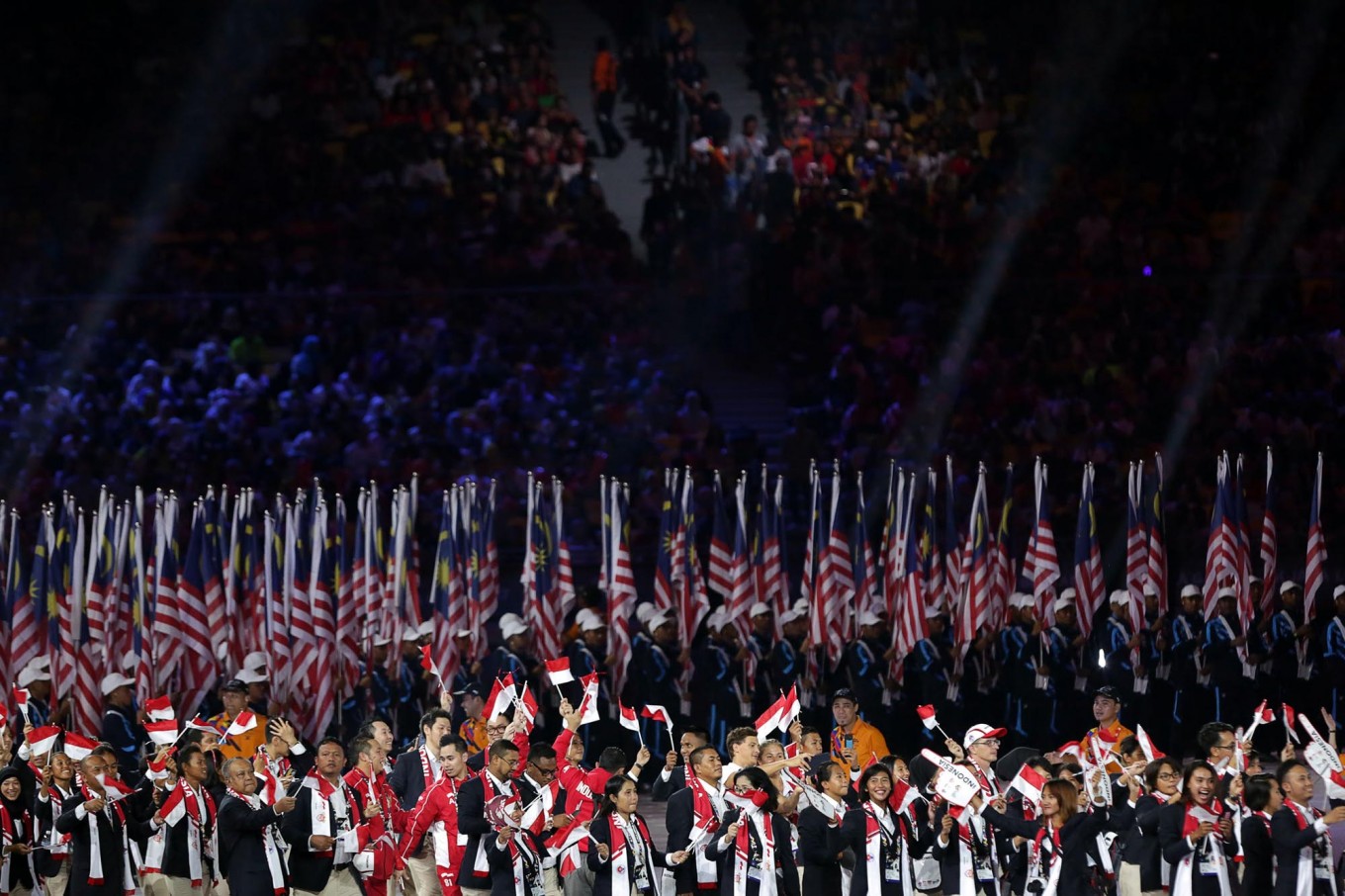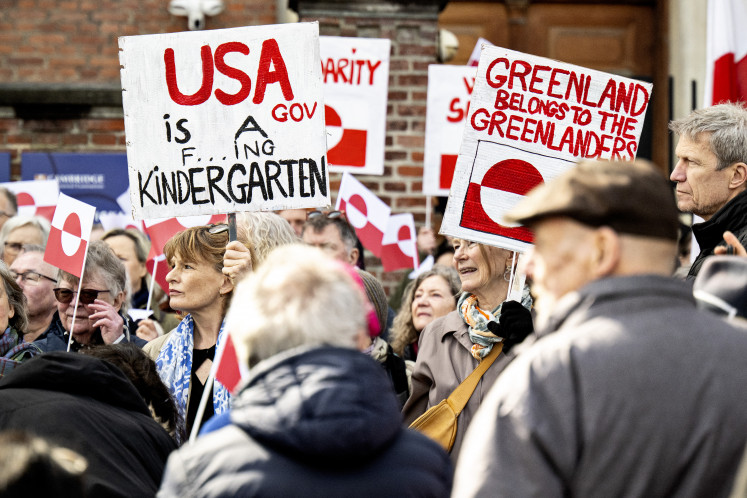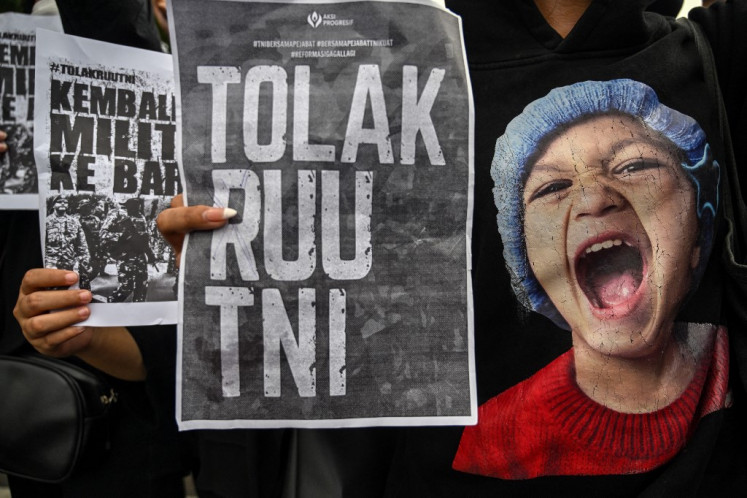Stop bickering: 60 years of Malaysia-Indonesia ties
As two of ASEAN founding members, any friction between Indonesia and Malaysia will impinge on ASEAN’s community building agenda.
Change text size
Gift Premium Articles
to Anyone
 The Indonesian delegation (foreground) marches during the SEA Games opening ceremony. (JP/Seto Wardhana)
The Indonesian delegation (foreground) marches during the SEA Games opening ceremony. (JP/Seto Wardhana)
T
he month of August was marked not only by the celebration of Independence Day by three member states – namely Singapore, Indonesia and Malaysia – but also by ASEAN’s 50th anniversary.
Interestingly, the biennial Southeast Asian Games (SEA Games) also fell in the same month. While ASEAN member states should embrace the SEA Games motto of “Rising Together”, the Games were somewhat stained by misunderstanding and divide over nearly trivial incidences.
The unintentional mistake on the Indonesian flag in the SEA Games booklet, a first of many subsequent mishaps, managed to revive the decades-long tension between citizens of Indonesia and Malaysia.
As two of ASEAN founding members, any friction between Indonesia and Malaysia will impinge on ASEAN’s community building agenda. Thus, the asymmetrical consequences of such editorial mistake remind us that we should not take the Indonesia-Malaysia affairs for granted, especially as we welcome the 60th anniversary of the bilateral relations.
If anything, the two nations should have already established solid footing in the sixth decade of their relationship instead of being easily provoked by small matters.
The Institute of Strategic and International Studies (ISIS) Malaysia hopes to re-examine the current state of affaisr of the bilateral relations in the upcoming Malaysia-Indonesia Strategic Bilateral Colloquium.
Expected to be held at the end of the year, the Colloquium aims to foster closer ties by suggesting methods to improve the strongest links between the two as well as proposing ways to safeguard the relations from potential flashpoints.
The Colloquium hopes to broach contemporary issues, among others, the future of Indonesia-Malaysia bilateral relations in the shifting geopolitical calibration in Southeast Asia, the problematic nexus between palm oil production and transnational haze, as well as the impacts of hoaxes on the bilateral relations.
The events surrounding the flag episode, too, concerns the susceptibility of the Indonesian population to provocation and anger, especially on issues relating to Malaysia.
There are a few reasons why Indonesians were quick to squirt out emotive reactions.
First, commonalities in history, culture, and religion could trigger the sense of “competition” between people from both nations.
Economic theory stipulates that competition is likely to be more intense when competing parties do not possess comparative advantage over one another.
When a tension arises, there would be a tendency to constantly compare one country with the other to ascertain the superiority between the two.
Second, atavistic memory is a strong element in the Indonesia-Malaysia dynamics. Any bilateral tempest between the two in this modern era would always be affected by past turbulent events.
Chief of these events is the konfrontasi, which set the tone of how Indonesians and Malaysians perceive each other.
Numerous tensions have also arisen from countless issues on migrant workers, “cultural theft”, border incursions and the wrongly-termed “Indonesian haze”.
This array of past events has entered the current unfriendly discourse which sprouted out of an unfortunate editorial blunder.
Such an occurrence is far from new and will likely repeat itself unless people from both nations work to dismantle this regressive mentality.
Third, the propensity to be emotionally triggered by inter-state misapprehension is due to deep-seated nationalistic values.
While many attempt to avoid any sort of inter-state confrontation, regrettably, some parties anticipate such collision to erupt. Indonesians are particularly affected due to theirstrong attribution with national symbols, history and independence.
A show of ultra-nationalism will not only preserve the bilateral conundrum, but also spill over into negative externality for ASEAN’s community building.
Fourth, this disruption could not have occurred at a less-fortunate timing. At a time when ASEAN’s centrality is more needed than ever, the cohesion among its member states – in this case Indonesia and Malaysia – is once again tested.
The spirits of sportsmanship, fairness, friendship and celebration that the SEA Games envisages seemed to be overwhelmed by the prevailing air of competition
While the youths (many of whom were involved in the Games as participants and audience) are the key ingredients to realizing ASEAN’s notion of community, many persisted on wasting time and energy to bicker on issues that divide the two countries, as well as ASEAN. If such a trend continues, ASEAN’s ambition in establishing regionalcohesion will remain a fleeting dream.
While the Internet offers an avenue for embittered youths to vent their frustration and anger, it also has the potential to facilitate constructive exchange on fostering ASEAN unity.
The cycle of offense-offended collision is a chicken-and-egg enigma where both parties tend to blame each other.
ASEAN youths need to strike a balance between patriotism to their respective country and regional unity, if ASEAN were to remain relevant in the years to come.
It is a public secret that konfrontasi was the source of long diplomatic friction between Indonesia and Malaysia post-independence. Yet, not many remember that the konfrontasi offered a foundation for the genesis of ASEAN, the one regional grouping that succeeds to maintain peace and prosperity among 10 states in Southeast Asia.
This is why we should quickly learn from this unfortunate episode of bilateral tension and strive to improve the already strong relations between the two.
The Colloquium could hopefully help to promote bilateral confidence that both nations have fostered in the past 60 years. Through this, we also hope to find ways to reduce the transformation of uncomfortable events into bilateral incidents in the future.
***
Both writers are Indonesian analysts at the Institute of Strategic and International Studies (ISIS) Malaysia.
---------------
We are looking for information, opinions, and in-depth analysis from experts or scholars in a variety of fields. We choose articles based on facts or opinions about general news, as well as quality analysis and commentary about Indonesia or international events. Send your piece to academia@jakpost.com.









